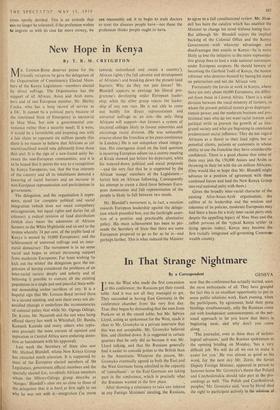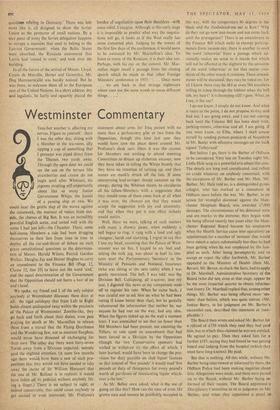In That Strange Nightmare
By a Correspondent GENEVA
IT was the West who made the first concession at this conference; the Russians got their round table. And it was not all they managed to get. They succeeded in having East Germany in the conference chamber from the very first day. True, they began by demanding that the men from Pankow sit at the round table; but Mr. Selwyn Lloyd, acting as spokesman for the West, made it clear to Mr. Gromyko in a private interview that this was not acceptable. Mr. Gromyko believed him, and climbed down. It is suggested in certain quarters that he only did so because it was Mr. Lloyd talking, and that the Russians generally find it easier to concede points to the British than to the Americans. Whatever the reason, Mr. Gromyko eventually agreed to both the East and the West Germans being admitted in the capacity of 'consultants': so the East Germans are taking part in the conference, which is precisely what the Russians wanted in the first place.
After showing a reluctance to take any interest in any Foreign Ministers' meeting, the Russians, now that the conference has actually started, seem the most enthusiastic of all. They have grasped the fact this is an excellent opportunity to put in some public relations work. Each evening, when the participants, by agreement, hold their press briefings simultaneously, only the Russians come out with loudspeaker announcements, or the per- sonal approach to let you know that theirs is beginning soon, and why don't you come along. . .
`The journalist, even in these days of techno- logical advances,' said the Russian spokesman at the opening briefing on Monday, 'has a very difficult job. We will do all we can to make it easier for you.' He was almost as good as his word, for the next day ■Mr. Zorin, the Soviet Deputy Foreign Minister, appeared in person to hammer home Mr. Gromyko's theme that Poland and Czechoslovakia should take part in the pro- ceedings as well. 'The Polish and Czechoslovak peoples,' Mr. Gromyko said, 'won by blood shed the right- to participate actively in the solution a questions relating to Germany.' There was lots more like it, all designed to show the Soviet Union as the protector of small nations. By a nice piece of irony the Soviet delegation happens to occupy a mansion that used to belong to the Latvian Government : when the Baltic States were absorbed, the Russians announced that Latvia had 'ceased to exist,' and took over the building.
In all the furore of the arrival of Messrs. Lloyd, Couve de Murville, Herter and Gromyko, Mr. Dag Hammarskjold was hardly noticed. But he was there, to welcome them all to the European seat of the United Nations, In a short address, dry and legalistic, he fairly and squarely placed the burden of negotiation upon their shoulders—with some relief, I imagine. Although at this early stage it is impossible to predict what way the negotia- tions will go, it looks as if the West' really has some concerted plan, Judging by the events of the first few days of the conference, it would seem to be animated by Mr. Macmillan's idea. To listen to many of the Russians, it is their idea too. Perhaps, with his eye on the summit, Mr. Mac- millan might recall a passage from the closing speech which he made to that other Foreign Ministers' conference in 1955: . . Once more . . . we are back in that strange nightmare where men use the same words to mean different things. . .



































 Previous page
Previous page